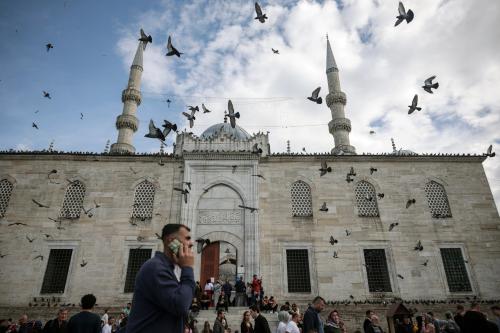The Cologne court’s decision to halt non-medical circumcisions earlier this summer marks a new low for religious freedom in 21st century Europe. It is the latest dip in a slippery slope that began with the condemnation of burkas and other forms of extremism but has landed squarely in the mainstream of religious practice.
In January, Dutch MPs called Islamic headscarves “a symbol of oppression.” Months later, the French Prime Minister suggested rethinking “ancestral traditions that are out of sync with the modern era,” such as ritual animal slaughter.
After the Cologne ruling, hospitals in Switzerland and Austria also suspended circumcisions. Last month, a Norwegian official proposed raising to fifteen the minimum age at which a boy may undergo the procedure – in direct contravention of Muslim and Jewish rites.
Ironically, these debates have sharpened at the very moment when European countries, led by Germany, had begun to make space for its newest citizens’ “ancestral traditions” alongside their own. As in neighboring countries, the German government realized it couldn’t do without a legitimate administrative partner if it was to assure the same rights – and corresponding state oversight – enjoyed by other recognized religions practiced by German citizens. Before the establishment of state-mosque relations, expansion of religious rights for Muslims in Germany happened largely in the courts, an arduous and time-consuming process that took for granted an adversarial administration.
Through institutions like the Deutsche Islam Konferenz (DIK), federal and local authorities have assumed ownership of state-mosque relations. To Chancellor Merkel’s credit, the DIK is arguably Europe’s most successful example of its kind. Its six years in existence have sent a strong signal to the real protagonists of religious integration under the constitution – local administrators – to engage and incorporate Islamic associations in their own cities and towns. As a result, for example, North-Rhine-Westphalia implemented large-scale Islamic education in public schools and Hamburg concluded an historic concordat with its Muslim communities.
At this moment of generational change, however, public debate has not helped observant Muslims blend into their new institutional contexts. Politicians perpetuate commonplaces and manufacture debates, ranging from the claim Muslims engage in willful deceit, to accusations of child endangerment or animal torture. Far-right groups repeatedly taunt mosque-goers with the prophet cartoons that caricature Muhammad, sometimes provoking major urban unrest.
Questioning whether Islam “belongs to Germany” is nowhere near the same register as “unerwünscht” of the bad old days. Nor does it represent much progress in the decades since “Deutschland ist kein Einwanderungsland” or “Kinder statt Inder.” These slogans contribute to the perception of a hostile state and society that Muslim minorities are being asked to “integrate” into with a smile.
Despite the importance of robust debate to a well-functioning diverse society, the circumcision moratorium signifies a qualitatively different threat. Unlike the case of head coverings or halal meat, opposition isn’t motivated by fears of conquest or the desire to consign religion to the “private sphere” (It’s hard to think of a more discreet profession of faith.) Instead, the ban signals a frontal attack on the religion itself – and like the proposed restrictions on halal slaughter, it ensnares Jews as well.
State by state, prominent outsiders are being enlisted to reach a compromise that would allow for circumcisions under tighter regulation. And it is not unreasonable to assume that religious practices will continue to evolve as a function of place and circumstance, if the precedent of 19th century Judaism provides a glimpse of what to expect. Many Muslims in the West have started donating to charity instead of carrying out ritual slaughter at feast time. The sightings of the moon that set Ramadan’s start and end are increasingly likely to rely on European measurements. European Muslims have begun theological doctorates at local universities, and imams have a greater familiarity with local languages and mores. Still, the implicit correlation between proposed religious reforms and social integration is tendentious: the real contest lies elsewhere, in schools and on the job market.
Opponents to mainstream Islamic and Jewish practices often couch their intentions in laudable terms, mobilizing on behalf of free speech and women’s or animal rights. However, they undermine religious rights guaranteed by the same constitution they brandish. This hardens positions and politicizes religious practices.
Most damaging of all, they weaken the movement to synthesize “ancestral” and European state traditions embodied by the participants of Islam councils like the DIK. This places religious leadership in the unenviable position between the “hammer” of the State and the “anvil” of Community. If current trends prevent them from delivering basic religious freedoms to their constituents, what’s to keep European Muslims from searching elsewhere for a more aggressive brand of advocacy?
The Brookings Institution is committed to quality, independence, and impact.
We are supported by a diverse array of funders. In line with our values and policies, each Brookings publication represents the sole views of its author(s).



Commentary
Op-edWrong Signals
September 14, 2012